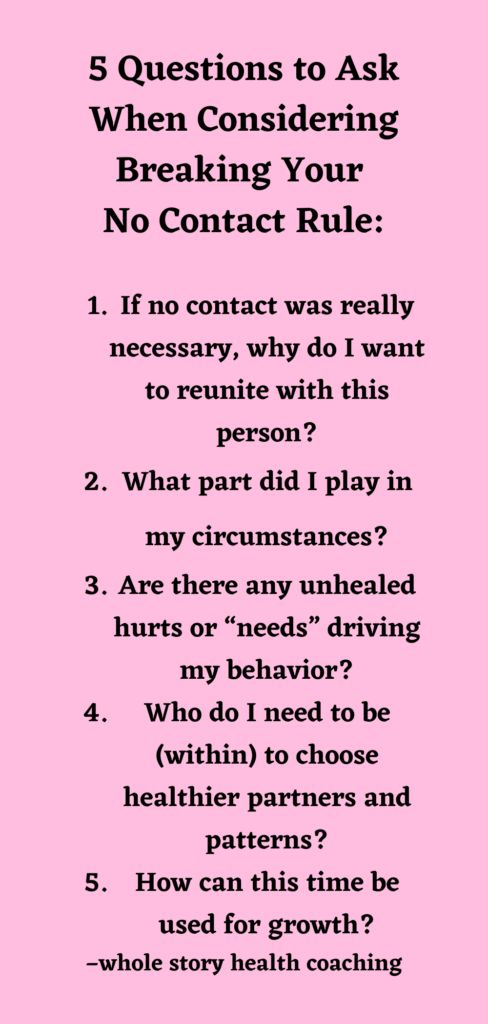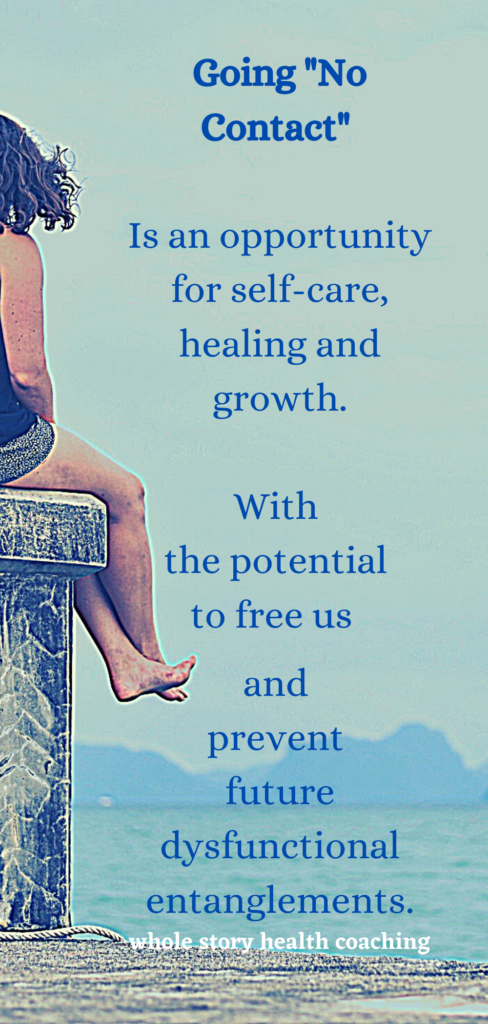When we remove ourselves from a toxic situation, it should be for self-preservation —not punishing the other person. So, before you initiate the No Contact Rule, make sure that you’re doing it for the right reasons.
For me, no contact was necessary to detox my mind and spirit. Though we often focus on physical detoxing, mental and emotional detox is just as important. Over the years , this is a lesson that I repeated until I finally learned it.
My friendships and relationships had a common thread — pretty poison. The people seemed pleasant and appealing on the outside but had toxic effects on my thoughts, emotions and peace. To save my sanity and sense of self, I had to act.
The Process of No Contact
Because of its importance and difficulty, no contact is not something we enter into lightly. Careful consideration and planning should be our top priorities.
If we do it properly, going “no contact” gives us an opportunity to take a much needed mental and emotional breath. It creates space for our self-care, healing and growth.
When driven by self-love, it has the potential free us from our present relationship difficulties and prevent future dysfunctional entanglements.
No Contact is NOT a Tactic
Unfortunately, there are sites, articles, and methodologies dedicated to using no contact as a manipulation tactic. Some suggest that we use it to make the other person miss our presence— with the intent to reunite with an ex.
This is not only unhealthy, but mentally and emotionally self-destructive.
Instead of coming up with methods to control and manipulate them, we can start to monitor ourselves.
The short-term goal during this period of freedom should be regaining some of our mental and emotional footing. In the long term, our goal should lean toward personal development.
Ideally, we should use this space, and emotional distance, for self-reflection. It’s an opportunity to stop wasting time obsessing about someone else—and start focusing on what really matters…our wellbeing.
What to Do BEFORE Going No Contact
When deciding to go no contact, it is in our best interest to establish it as a mindset and a commitment to ourselves—with our ultimate outcome focused on growth and healing.
This important step helps us to recognize that we are moving towards a permanent solution, instead of bandaging a wound.
Below are a few things to prepare for before taking on this monumental emotional task.
# 1 Understand that it will be painful.
The fact that we are instituting the no contact rule implies that the relationship or friendship was significant enough to make walking away a heartbreaking task.
It also implies that we’ve dealt with a different type of pain that made this self-preserving act a necessity.
Because of the complicated feelings involved, there will be days when every minute is painful, though some days will be much easier.
Despite the initial distress, we have to develop the tools to increase our emotional health and strength.
The way to do that is learning to work through the pain, deal with the discomfort, and sit with the anxiety.
Expect the pain, honor the sadness, feel the anger. But, maintain the distance.
# 2 Recognize that you will be tempted.
Holidays, birthdays, and anniversaries are three significant emotional triggers during no contact. There are also cues such as:
- places
- movies/shows
- favorite foods
- things associated with the person or the friendship/relationship
One struggle that I personally dealt with was being excited about something, or wanting to just share something that crossed my mind. In those moments, I had to remind myself that I was not contacting the person for a reason.
Keep in mind that temptations during no contact are common. Understanding that fact gives us the chance to figure out when they are most likely and plan how to deal with them.
# 3 Remember your reasons for “No Contact”
As time goes on, we may start to forget the negative experiences—and start to reminisce about the good times. It is during these moments that we are more likely to self-sabotage. While it is fine to acknowledge that there were good times, we can’t allow those tempting memories to derail our progress.
The questions that we need ask ourselves when we are tempted to break our own “No Contact rule” are:
- If no contact was really necessary, why do I want to reunite with this person?
- What part did I play in my circumstances?
- Are there any unhealed hurts or “needs” driving my behavior?
- Who do I need to be (within) to choose healthier partners?
- How can this time be used for growth?
# 4 Determine how you got to this point
Although it is good that we recognize the need to distance ourselves from our “no contact person”, we must also take the time to understand which paths led us to this type of relationship or friendship.
This step involves paying attention to ourselves and taking an honest look within.
Knowing how you ended up in this position will help you to prevent finding yourself in a similar situation in the future. Here are a few tips:
- Ask yourself what factors were involved.
- Look for any patterns that you have been living out.
- Understand what you were seeking or ignoring in the process.
Being able to address these issues will provide valuable insight and the knowledge to build a wise foundation on.
It’s Really About Us
We can’t and shouldn’t try to use the No Contact Rule to force someone else to change. It’s hard enough to do it ourselves—even when we want to.
During our separation from this situation, we will find out that our behaviors, and the thoughts behind them are deeply rooted.
We will also learn that taking 30 days “off” from someone (or a circumstance) won’t magically dig up those roots. It won’t change or fix what was broken. As we all know, change takes patience, lots of time and consistent effort. It also takes willingness.
These facts are important to remember , especially if no contact is being used to try to alter someone else’s feelings or actions.
We should never have to frighten or manipulate another person into wanting to be with us. If that happens, we need to take a step back from the relationship.
Instead of focusing on changing them, we need to stare deeply into our own soul.




